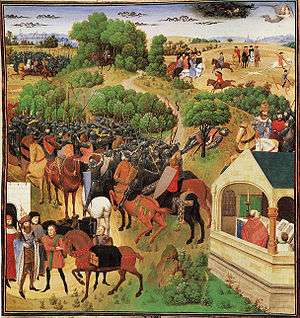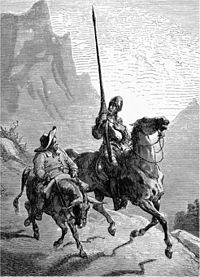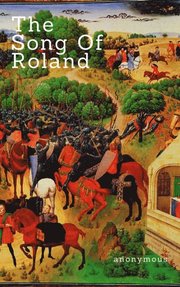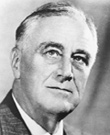Pro-war and anti-war tendencies in literature and movies
Posted: Sat Nov 12, 2011 7:29 pm
In a post in another thread that I thought I was not going to add to, Art wrote:
I'm going to argue that The Song of Roland, The Lord of the Rings and the Rambo movies can be seen as pro-war mouthpieces, whereas Macbeth and Don Quixote are antiwar works. What separates the pro-war from the anti-war pieces is how they describe they characters and what the war leads to. The critical question, I think, is how "good" and justified" the heroes are and how bad and utterly horrible their enemies are, and whether the loss of life in the war is "worth it".
 Let's begin with the Song of Roland. I once read an abbreviated version of it, through which I gathered that while the hero of the Song of Roland is of course Roland himself, a noble knight, a still more important character in the story is king Charlemagne. http://en.wikipedia.org/wiki/Charlemagne wrote about Charlemagne:
Let's begin with the Song of Roland. I once read an abbreviated version of it, through which I gathered that while the hero of the Song of Roland is of course Roland himself, a noble knight, a still more important character in the story is king Charlemagne. http://en.wikipedia.org/wiki/Charlemagne wrote about Charlemagne:
 Charlemagne died in 814. The Song of Roland, which deals with Charlemagne's defeat in Spain at the hands of Spanish Muslims, was written at least 200 years later, during the heyday of Christian Crusades against Muslims in Jerusalem. At this time, Charlemagne's defeat at the hand of Muslim enemies had probably become a problem to the Christian Europeans that they needed to address. How could their king have been defeated? How could he still be regarded as a great champion of Christianity? And how could the ignoble defeat be understood as a truly heroic battle?
Charlemagne died in 814. The Song of Roland, which deals with Charlemagne's defeat in Spain at the hands of Spanish Muslims, was written at least 200 years later, during the heyday of Christian Crusades against Muslims in Jerusalem. At this time, Charlemagne's defeat at the hand of Muslim enemies had probably become a problem to the Christian Europeans that they needed to address. How could their king have been defeated? How could he still be regarded as a great champion of Christianity? And how could the ignoble defeat be understood as a truly heroic battle?
According to the abbreviated version of The Song of Roland that I read, Charlemagne was 200 years old when this battle took place! That is of course impossible. By making the king so impossibly old, The Song of Roland tells us that Charlemagne was more than a mere human. He must have been chosen by God, and as such, he had been granted a life span that no other mortals can hope for.
And because Charlemagne must have been chosen by God to be the King, any war he chose to fight to defend his own rule must have been just. How do you know the war was just? Because it was fought by Charlemagne.
 There is more. The Song of Roland tells us that the Christians lost against the Muslims because the Muslims used treachery against them. The Muslims, therefore, were no brave warriors. Through treachery, the Muslims could muster an army of 400,000 against Charlemagne's rearguard of 20,000 men, led by Charlemagne's nephew, Roland. Roland himself was incredibly brave as he fought the Muslims. He was too brave, actually, because he refused to blow his olifant horn to call for help until his army was utterly defeated. He did, in fact, eventually blow his horn to call for help, and then he blew so hard that he burst both his temples!
There is more. The Song of Roland tells us that the Christians lost against the Muslims because the Muslims used treachery against them. The Muslims, therefore, were no brave warriors. Through treachery, the Muslims could muster an army of 400,000 against Charlemagne's rearguard of 20,000 men, led by Charlemagne's nephew, Roland. Roland himself was incredibly brave as he fought the Muslims. He was too brave, actually, because he refused to blow his olifant horn to call for help until his army was utterly defeated. He did, in fact, eventually blow his horn to call for help, and then he blew so hard that he burst both his temples! 
 He had to stop the infidels from stealing his holy sword, Durendal, which contained wonderful relics of highly important saints. Miraculously, therefore, he cut a large gap in the mountainside as he tried to destroy his sword.
He had to stop the infidels from stealing his holy sword, Durendal, which contained wonderful relics of highly important saints. Miraculously, therefore, he cut a large gap in the mountainside as he tried to destroy his sword.
 One of the men who fought with Roland was the Archbishop Turpin. As an archbishop, Turpin could certainly be seen as an arbiter of what was right and wrong. The archbishop took a very active part of the battle himself and killed many Muslims. In this picture, you can see Charlemagne and Archbishop Turpin face off two Muslims enemies who look like devils.
One of the men who fought with Roland was the Archbishop Turpin. As an archbishop, Turpin could certainly be seen as an arbiter of what was right and wrong. The archbishop took a very active part of the battle himself and killed many Muslims. In this picture, you can see Charlemagne and Archbishop Turpin face off two Muslims enemies who look like devils.
How does The Song of Roland end? Well, Charlemagne is sort of successful. One of his most important enemies escapes, although Roland has managed to cut off his right hand in battle. But with the help of God, Charlemagne slays another important enemy. He takes the city of Saragossa and forces everyone there to convert to Christianity. The traitor Ganelon is drawn and quartered. So, by and large, Charlemagne is seen as defeating his infidel enemies in a holy war.
So we can see that the "good" characters here have miraculous characteristics and are extremely brave, and they defeat their satanic enemies thanks to their own wonderful bravery and the help of God. Their good fight leads to terrifying losses but also to the defeat of the horrible enemy. All of this means that The Song of Roland can be seen as a propaganda piece for war. Bear in mind, too, that this literary work was written during the heyday of the Crusades, and an important purpose of it may have been to persuade more European Christians to go to war against the Muslims in Jerusalem.
Because this post is long enough already, I will stop now and talk about the other literary works later.
Ann
Fascinating. The Great Books of the Western World have been pushing a hidden antiwar agenda. Like Art, I applaud that. However, this statement of Art's left me with the question: How do you know if a book (or a movie) is trying to tell you that war is bad? How does that show? And how, by contrast, can you see that a work of literature (or a movie) is telling you that war is good? I'm not going to discuss documentaries or propaganda pieces that discuss specific modern wars, like the Iraq war, because it is easy enough to figure out what their agenda is. I'm going to talk about literature that deals with war in a more abstract sense. The literary works that I'm going to discuss, at least briefly, are The Song of Roland, the oldest surviving major work of French literature, written in the eleventh or twelfth century, The Tragedy of Macbeth by Shakespeare (whoever he was) from the earliest years of the 17th century, Don Quixote by Miguel de Cervantes (whoever he was), written at about the same time as Macbeth, and The Lord of the Rings by J.R.R. Tolkien, written between 1937 and 1949. I'm also going to say something very brief about the movie character Rambo.My conclusion from a great deal of study is that the Great Books of the Western World have basically been a propaganda tool for an underground liberal antiwar humanist movement... a movement which I, myself, in fact applaud
I'm going to argue that The Song of Roland, The Lord of the Rings and the Rambo movies can be seen as pro-war mouthpieces, whereas Macbeth and Don Quixote are antiwar works. What separates the pro-war from the anti-war pieces is how they describe they characters and what the war leads to. The critical question, I think, is how "good" and justified" the heroes are and how bad and utterly horrible their enemies are, and whether the loss of life in the war is "worth it".

Charlemagne.
So Charlemagne was a real person and a great king, certainly one of the most notable kings of European history. However, Charlemagne suffered one stinging defeat during his career:Charlemagne ( /ˈʃɑrlɨmeɪn/, also /ˈʃɑrləmaɪn/; French pronunciation: [ʃaʁ.lə.maɲ]; Latin: Carolus Magnus or Karolus Magnus, meaning Charles the Great; (possibly 742 – 28 January 814) was King of the Franks from 768 and Emperor of the Romans (Imperator Romanorum) from 800 to his death in 814. He expanded the Frankish kingdom into an empire that incorporated much of Western and Central Europe. During his reign, he conquered Italy and was crowned Imperator Augustus by Pope Leo III on 25 December 800. His rule is also associated with the Carolingian Renaissance, a revival of art, religion, and culture through the medium of the Catholic Church. Through his foreign conquests and internal reforms, Charlemagne helped define both Western Europe and the European Middle Ages. He is numbered as Charles I in the regnal lists of Germany, the Holy Roman Empire, and France.
Charlemagne was defeated in Spain by the Spanish Muslims, but that didn't stop him from being the king of much of Western and Central Europe.Charlemagne continued the policy of his father towards the papacy and became its protector, removing the Lombards from power in Italy, and leading an incursion into Muslim Spain, to which he was invited by the Muslim governor of Barcelona. Charlemagne was promised several Iberian cities in return for giving military aid to the governor; however, the deal was withdrawn. Subsequently, Charlemagne's retreating army experienced its worst defeat at the hands of the Basques, at the Battle of Roncesvalles (778) (memorialised, although heavily fictionalised, in the Song of Roland).

A crusade.
According to the abbreviated version of The Song of Roland that I read, Charlemagne was 200 years old when this battle took place! That is of course impossible. By making the king so impossibly old, The Song of Roland tells us that Charlemagne was more than a mere human. He must have been chosen by God, and as such, he had been granted a life span that no other mortals can hope for.
And because Charlemagne must have been chosen by God to be the King, any war he chose to fight to defend his own rule must have been just. How do you know the war was just? Because it was fought by Charlemagne.

Scenes from The Song of Roland.

La Brèche de Roland.

How does The Song of Roland end? Well, Charlemagne is sort of successful. One of his most important enemies escapes, although Roland has managed to cut off his right hand in battle. But with the help of God, Charlemagne slays another important enemy. He takes the city of Saragossa and forces everyone there to convert to Christianity. The traitor Ganelon is drawn and quartered. So, by and large, Charlemagne is seen as defeating his infidel enemies in a holy war.
So we can see that the "good" characters here have miraculous characteristics and are extremely brave, and they defeat their satanic enemies thanks to their own wonderful bravery and the help of God. Their good fight leads to terrifying losses but also to the defeat of the horrible enemy. All of this means that The Song of Roland can be seen as a propaganda piece for war. Bear in mind, too, that this literary work was written during the heyday of the Crusades, and an important purpose of it may have been to persuade more European Christians to go to war against the Muslims in Jerusalem.
Because this post is long enough already, I will stop now and talk about the other literary works later.
Ann















